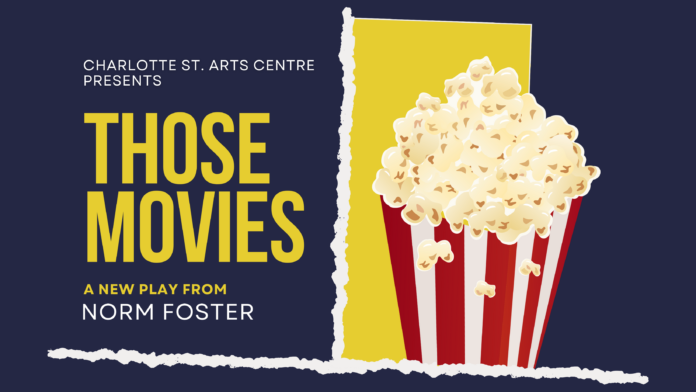

On Nov. 17, the Charlotte Street Arts Centre opened its doors to the premiere of Norm Foster’s latest play, Those Movies. This stage-reading performance was a fundraising event where all proceeds went to the UNB Arts Centre.
Foster has held the title of the most-produced playwright in Canada for the past twenty years. With this play, he challenges the idea of love in rom-com movies. He introduces compelling characters that incite the audience to question where they fall in the romantic relationship spectrum.
“I saw that scene with Julia Roberts and Hugh Grant where she says, ‘I’m just a girl standing in front of a boy asking him to love her,’ and I thought, ‘that’s ridiculous,'” said the playwright.
With continuous references from Notting Hill (1999) sprinkled throughout the play, Foster made the audience have no other choice but to root for the hopeless romantics. However, he states how 90s rom-coms play a role in today’s expectations of love and relationships.
“I started to think about other things that had happened in those movies that are sort of unbelievable and I decided to write a play about that.”
Those Movies present us with Harry, who after two months of pinning, finally gathers enough courage to ask Millie for a date. At the same time, Millie plans to make Harry go on a double date with her, her accident-prone cousin Chelsea and Harry’s friend Patrick. The play follows the journey of these four middle-aged friends as they navigate the tricky path to finding love.
Foster said he believes that the world is divided between hopeless romantics and realists. He identifies himself with Patrick, who starts out as a Casanova and ends the play by giving one of “those rom-com movie speeches to a woman he had only met for five hours.”
“I think I’m a hopeless romantic…Chelsea is kind of a helpless woman, nothing works out for her, but you end up rooting for her and Patrick,” said Foster.
He divided four characters into two couples who represent the relationship of a “hopeless romantic” and a “realist.” This made it possible to achieve theatrical authenticity where all characters serve as a unique perspective.
“Theater is totally different to radio…it gave me a step up front to do things differently without being anonymous,” said Foster. “It gave me a platform where I could stand up, be myself and do whatever I wanted.”
He performed Harry’s part with passion and fierce commitment as if he transported himself to his amateur days being part of the local group, Theatre Fredericton.
“There’s something about each of these characters that I know I created, and I’m happy about them,” he said.
Foster is also an active mentor for young playwrights who are trying to get their plays picked up by production companies. He advises aspiring playwrights from small towns to keep submitting their plays even if they get no responses. To him, persistence is the key to success in this field.
He mentored comedic playwrights like Kristen Da Silva from Toronto, recipient of the Stage West Pechet Family Comedy Award in 2016. This experience taught him that even if you fight all odds of getting picked up, somebody will read your play.
“They’re always looking for the next me,” he said. “I’m happy to help any new playwrights as long as they don’t get bigger than me.”
Foster wrote this play to deliver a whole-hearted message to his target audience
“When I’m reading a play in my office, I just enjoy being myself and thinking about these characters,” he said. “ It’s much more enjoyable. It’s much more fulfilling.”
Although Foster said he did not know if he had more plays in him, he made a 19-year-old college student ponder on the thought that in a world filled with what-ifs, you need to take action to develop your own arc. Even if it means not finding your Hugh Grant in every bookstore you walk in.
